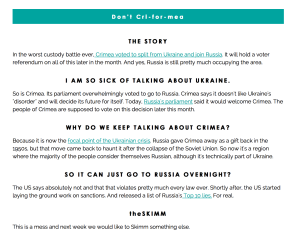Similar to Monday’s discussion about social media changes, we will be discussing condensation within this realm and what such tailoring has done for our communication.
Famously, and sometimes notoriously, Twitter champions what we could call “tailored text”. Rather than have an unlimited amount of space to express one’s thought, only 140 characters are given. In an almost “Challenge Accepted” sort of manner, Twitter users reacted immediately, and tweeting has become an immensely popular form of communicating. 
However, it seems like tailored text is no longer limited to tweets. News sources like theSkimm purposefully deliver the latest information in a compact, quick and simple e-mail. The Wall Street Journal describes the newer form of news as “a daily email newsletter that is transmitted to subscribers weekday mornings at about 6 a.m. Eastern Time. It delivers the news of the day along with a short explanation of the context and import in a just-us-girls voice that manages neither to patronize news junkies nor alienate infrequent readers.” Not to be underestimated, theSkimm is only in its second year and has already picked up 500,000 subscribers. Additionally, they report having a daily open rate of more than 45%, which almost doubles the average media and publishing email campaign of 23%.
What traditional outlets like newspapers spend millions of trees and dimes on, or what televised media like CNN or Fox News spend all day trying to reiterate, is suddenly handled in a five minute commitment within one’s morning routine. As a user of most of these programs, I have been thinking constantly about such a shift and what it represents for the future of communication. I am one of half a million subscribers, and theSkimm is only a toddler in the social media school. Despite having been a subscriber for only a month, I have already found myself leaning towards the smart phone, rather than picking up a paper or changing a TV channel. Is this the way that things should be going? If we’re cutting communication, what happens next? What happens when there is nothing left to cut?
Not to say that condensed communication is completely a crime (certainly not through that alliteration); critics often point out how unnecessary and repetitive modern news can become. Countless outlets cover the same topics, and spend massive amounts of time and money on issues that can seemingly be communicated in 140 characters. Is it better, then, to save energy and resources better spent on the next piece of news? Are we becoming more selective in our communication, and choosing to cut out the waste that creates miscommunication, disagreements and overall poor d?
What do you think, readers? Should conversation, particularly in media, be cut down? Or is lengthy and in-depth the way to go?


 Follow
Follow
2 Comments
I couldn’t agree more! theSkimm is extremely unique, and while some see it is a cheap shortcut, it is not. The creators spend a significant amount of time reading the news and interpreting it before creating the email. This way, it is a deliverable that keeps the user in mind; aka “user-centered.”
I think the benefit of online news sources–be it the Skimm or news channels’ websites–is that it quickly alerts readers to various news stories but allows them to go in-depth on stories they are actually interested in. If I watch CNN, I have to listen to several different news stories that I am not particularly interested just to listen to the one story I actually am interested in (and don’t get me started on commercials). However, if I go on CNN’s website, I can get a quick update on Ebola, I learn that North and South Korea are talking, as well as other stories, but I am not forced to read a whole story I am not interested in.
While I do think there is a purpose and need for televised news networks, I think the main focus is shifting from television to online, and I agree with the shift.